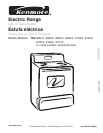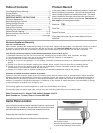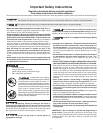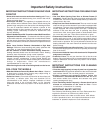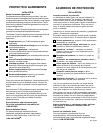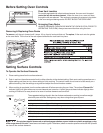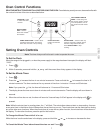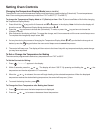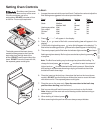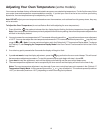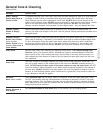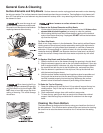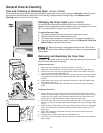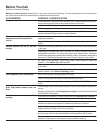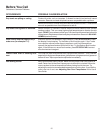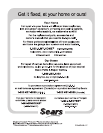
14
Before you call for service,
review this list. It may save you time and expense. The list includes common occurrences that
are not the result of defective workmanship or materials in this appliance.
POSSIBLE CAUSE/SOLUTION
Poor installation. Place oven rack in center of oven. Place a level on the oven rack.
Adjust leveling legs at base of range until the oven rack is level.
Be sure floor is level and is strong and stable enough to adequately support range.
If floor is sagging or sloping, contact a carpenter to correct the situation.
Kitchen cabinet alignment may make range appear unlevel. Be sure cabinets are
square and have sufficient room for range clearance.
Cabinets not square or are built in too tightly. Contact builder or installer to make
appliance accessible.
Carpet interferes with range. Provide sufficient space so range can be lifted over
carpet.
Incorrect control setting. Make sure the correct control is on for the surface element
to be used.
Lightweight or warped pans used. Use only flat, evenly balanced, medium or
heavyweight cookware. Flat pans heat better than warped pans. Cookware
materials and weight of the material affect heating. Heavy- and medium-weight pans
heat evenly. Because lightweight pans heat unevenly, foods may burn easily.
No power to the appliance. Check steps under "Entire Appliance Does Not
Operate" in this Before You Call Checklist.
Incorrect control setting. Make sure the correct control is on for the surface element
to be used.
Element not making contact in block. Follow instructions under "Surface Elements
and Drip Bowls" in the Care & Cleaning section.
Make sure cord/plug is plugged tightly into outlet.
The time of day must first be set in order to operate the oven.
Service wiring is not complete. Contact Sears at 1-800-4-MY-HOME® (see back
cover).
Power outage. Check house lights to be sure. Call your local electric company for
service.
Replace or tighten bulb. See Changing Oven Light (some models) in this Use &
Care Guide for instructions.
Control(s) not set properly. Follow instructions under Setting Oven Controls.
Make sure oven door is opened to broil stop position.
Meat too close to the element. Reposition the rack to provide proper clearance
between the meat and the element. Preheat broil element for searing.
Meat not properly prepared. Remove excess fat from meat. Cut remaining fatty
edges to prevent curling, but do not cut into lean.
Insert on broiler pan wrong side up and grease not draining. Always place insert on
the broiler pan with ribs up and slots down to allow grease to drip into pan.
Grease has built up on oven surfaces. Regular cleaning is necessary when broiling
frequently. Old grease or food spatters cause excessive smoking.
OCCURRENCE
Range is not level.
Cannot move appliance easily.
Appliance must be accessible for
service.
Surface element too hot or not hot
enough.
Surface element does not heat.
Entire appliance does not operate.
Oven light (some models) does not
work.
Oven smokes excessively during
broiling.
Before You Call
Solutions to Common Problems



